How Britain's top personal trainers fuel themselves
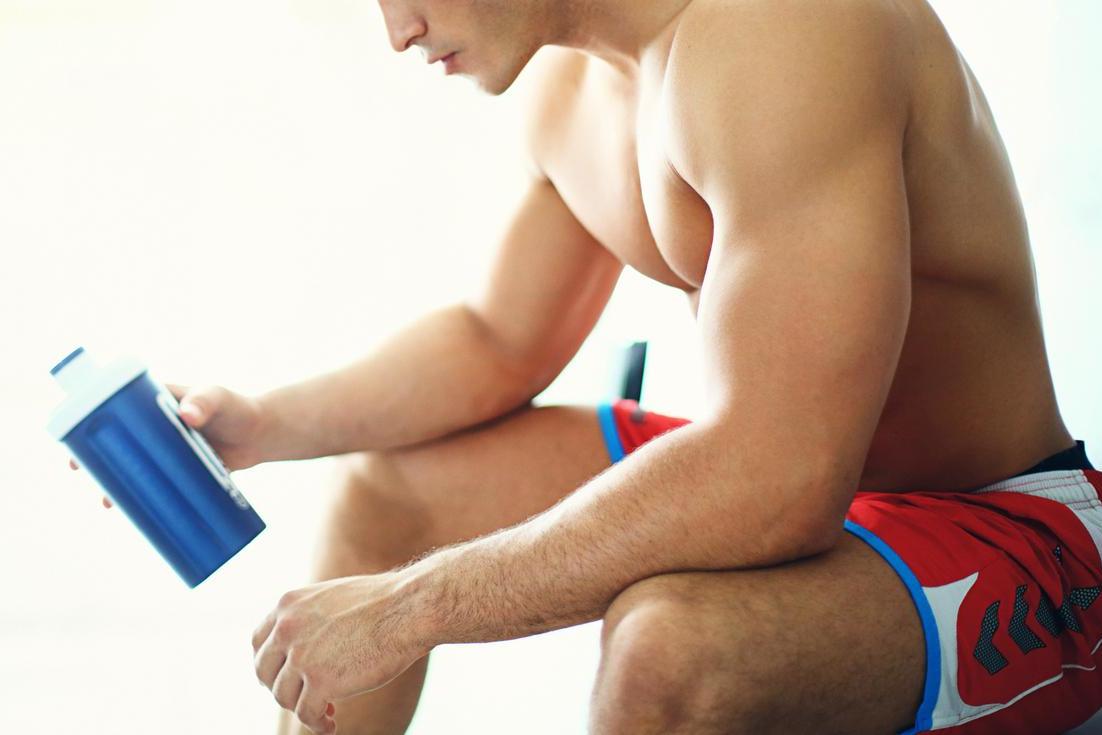
Your support helps us to tell the story
From reproductive rights to climate change to Big Tech, The Independent is on the ground when the story is developing. Whether it's investigating the financials of Elon Musk's pro-Trump PAC or producing our latest documentary, 'The A Word', which shines a light on the American women fighting for reproductive rights, we know how important it is to parse out the facts from the messaging.
At such a critical moment in US history, we need reporters on the ground. Your donation allows us to keep sending journalists to speak to both sides of the story.
The Independent is trusted by Americans across the entire political spectrum. And unlike many other quality news outlets, we choose not to lock Americans out of our reporting and analysis with paywalls. We believe quality journalism should be available to everyone, paid for by those who can afford it.
Your support makes all the difference.How you eat can have a huge effect on the results you get from your workout, and this is something Britain’s top personal trainers know better than anyone.
If you’re putting in a load of hard work in the gym, why negate that by fuelling your body poorly?
Protein is, of course, crucial for repairing muscles and delivering those all important #gains. But it turns out there’s no one-size-fits all approach.
While the majority of PTs eat a lot to keep themselves fuelled up and fighting, one revealed to The Independent how he motors on by intermittent fasting.
Of course, personal trainers have very different lifestyles to the rest of us, so if you’re sitting at a desk all day it’s probably not wise to copy their days exactly. But there are definitely secrets we can all mix into our lives.
So how do the top PTs fuel themselves? We asked them to reveal their secrets.
Rich Tidmarsh
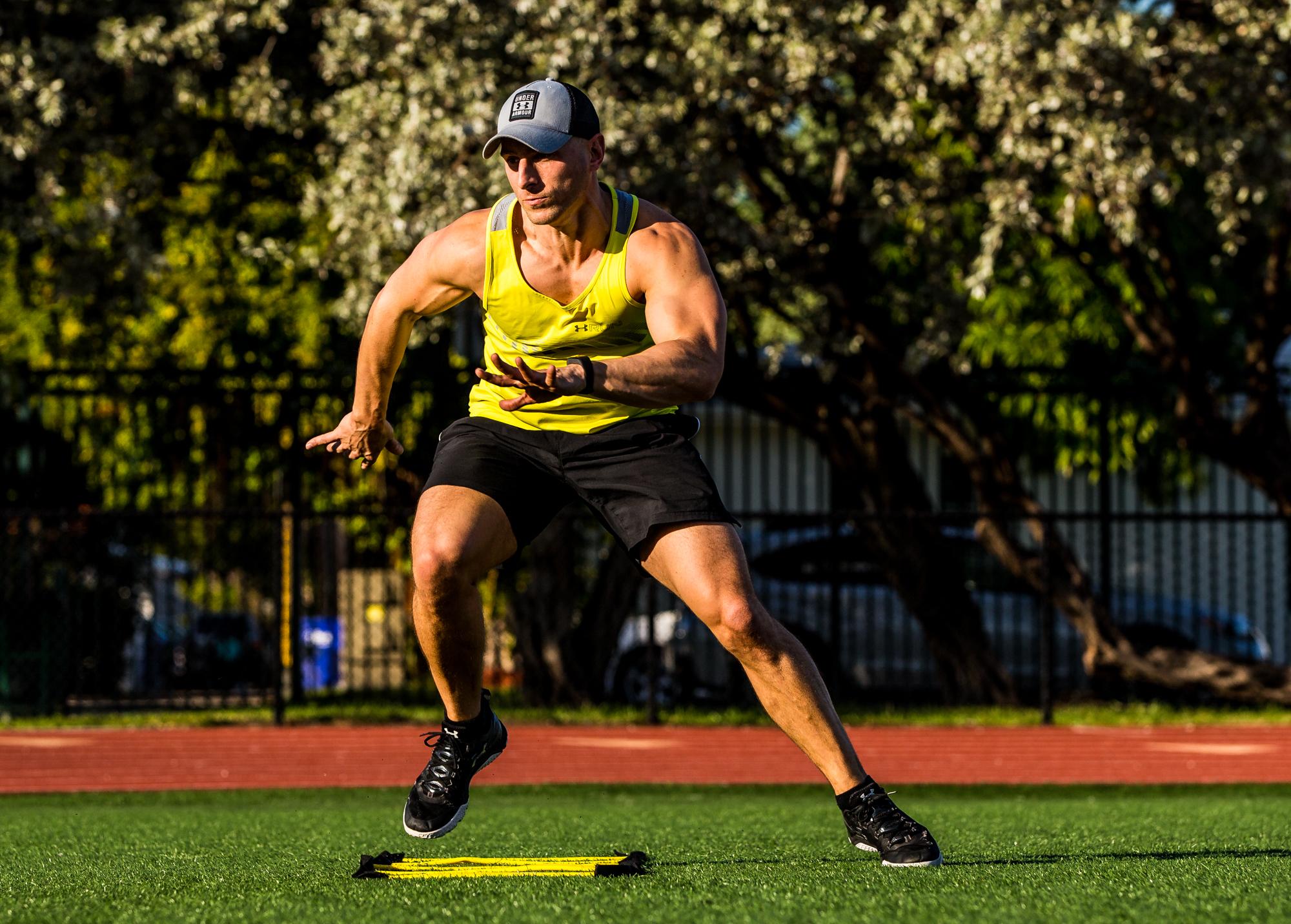
Rich Tidmarsh is the owner and lead trainer of London gym Reach Fitness in Clapham. Rich trains a host of international athletes including Jamie Roberts and James Horwill, and well known faces including Professor Green, Jessie Ware and Vogue Williams.
I aim for around 4,000 calories a day, 180g of protein and use carbohydrates to recover effectively from training and help with my sleep patterns. An average day looks a little like this...
5.30am - up and immediately drink two pints of water.
5.45am - make a huge shake at home: 300ml water, two scoops Optimum Nutrition strawberry whey protein, one scoop glutamine, two handfuls of mixed frozen berries, one scoop of greens powder.
6am - espresso
Then it’s all action training clients, athletes and groups until around 10am when I will have a second breakfast.
10am - four scrambled eggs with 200g of smoked salmon, cherry tomatoes and half and avocado.
Then I’m ready for meetings with my team and more sessions with clients where I will drink water and green tea throughout.
My third main meal of the day will be a Soulmate Life meal. I love what these guys do, delivering me chef-cooked high protein meals that I can trust.
I train at around 2pm most days, which means a flat white at 1.30pm for a little caffeine kick. During training I will throw Optimum Nutrition BCAA into my water which protects my lean muscle mass during intense sessions.
After training it’s time to refuel with a protein-packed shake: chocolate whey, peppermint extract, frozen banana, oats, creatine and glutamine.
Then it’s into an action evening of group sessions and clients where I will snack on 90 per cent dark chocolate squares and shelled pistachios.
I find a hot yoga session 8pm to 9pm is a great way to boost the body and mind, after which I will eat BIG! Searing two tuna steaks takes no time at all, stir-frying a mountain of broccoli and a large portion of brown rice.
Zinc and magnesium supplements before bed to help with sleep and a casein shake if I haven’t hit my protein levels for the day. Job done. And repeat!
Nicola Addison
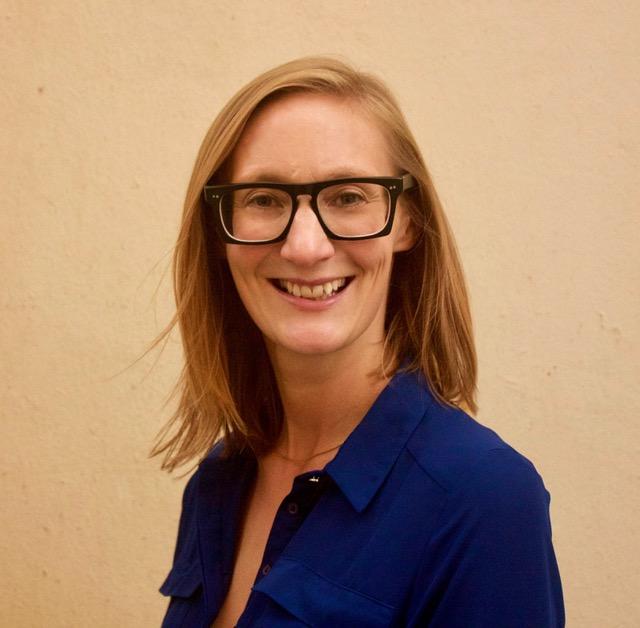
Nicola Addison is a wellness expert and owner of Eqvvs personal training in Knightsbridge. She has trained Elle Macpherson, Daisy Lowe and Erin O’Connor.
I am up super early for work. Yes, my alarm goes at 4.40am! With a pretty lengthy commute (I live in Brighton and work in London), breakfast for me is on the go. I usually have a Neat Nutrition protein shake and a flat white on my train.
The next time I eat will usually be 11.30/12ish for lunch. This is a real mixture depending on where I am but I will always try to make sure protein is present. For example I may have a sandwich but then will buy some additional deli meats. Or I will grab a salad and then an additional chicken breast. Sometimes I’ll grab a soup and also one of those hard boiled egg combos that are now plentiful in shops.
I will sometimes have an afternoon snack, particularly if I have had a very energetic day or if I have trained. At the minute this is a Grenade bar. They are delish!
My evening meals are pretty simple – spag bol or bangers and mash. The one thing I do try to do is leave at least two hours between eating my evening meal and going to bed.
I will probably have two flat whites a day, and these will usually be in the morning. I will often also have a tea mid-afternoon. I am not currently taking any supplements, but when I did I just took a simple multivitamin from Wild Nutrition.
Max Lowery
Max Lowery is a personal trainer and founder of the 2 Meal Day, which involves eating either breakfast and lunch or lunch and dinner, possibly with a snack in between the two, and fasting the rest of the time.
Since I started intermittent fasting, I no longer look at food in terms of energy. For my day to day activities – training clients, teaching classes and running my website, I prefer to rely on my stored body fat as a form of energy.
Intermittent Fasting trains your body to come fat adapted, so you are no longer dependent on the sugars in food for energy. Because I eat to nourish my body and not for energy, it means I am FULL of energy all day long.
Fat is a much more efficient and sustainable fuel source than carbohydrate - not only that, but also hormones like norepinephrine are released which has a direct effect on your mental alertness. Digestion takes up a lot of energy, so during my fast I free up that energy for other purposes.
I aim for a 16 hour fast every day, so I often don’t eat until 2pm or 3pm, during the fast I drink nothing but water and I might have a green tea every now and then. When I do break my fast I eat a diet high in fat, with an equal amount of protein and carbohydrate. Recently I have been eating a lot less meat so I eat a lot of vegetables! I don’t count calories or macronutrients.
I don’t take any sports supplements like protein shakes. I take high quality fish oil by Bare Biology, and before bed I take zinc and magnesium. I do most of my training fasted, which allows my body to become as efficient as possible at supplying itself with energy, becoming more metabolically efficient.
Fat is a better fuel source for low intensity, aerobic activities like running, cycling and walking. Once the intensity increases to anaerobic activities like sprinting and weightlifting, carbohydrates can have an effect on performance. Because of this, I do my weight training fasted but I will make a homemade smoothie before sprint training - usually frozen banana, cacao and cashew nut milk.
Tom Mans
Tom Mans is a personal trainer and certified strength and conditioning specialist with over 10 years’ experience working in the fitness industry and elite level sport.
On an average training day (five to six days a week) eat around 3200 - 3400 calories and then on rest days and weekends and try and eat less, at around 2600 calories.
An example of what I may eat on the average day would be :
5:30am - filter coffee and a protein smoothie made with 30g protein, frozen fruit, frozen spinach, greens powder and 40g oats.
Mid morning - porridge with fruit.
Lunch - 200g meat or fish (for example, two chicken breasts, two salmon fillets, 200g chilli con carne or a large steak), 75g rice, pasta or couscous and a large portion of salad and veg.
Mid afternoon - protein shake or protein bar.
Dinner - similar to lunch. I normally spend 30-45mins each evening cooking dinner for my girlfriend and me, making enough for lunch the next day .
I drink five to six litres of water a day too.
I try to train mid to late afternoon and will make sure I have a large amount of carbs in my pre-workout meal, which is usually lunch one to two hours before I train. I also have a cup of tea an hour before training.
With regard to supplements, I take whey protein, creatine, multivitamins, omega 3 fish oils, magnesium and zinc before bed, and vitamin D in the winter.
However I do enjoy a few beers and the odd espresso martini with my friends on the weekend. I use a 80:20 rule where I eat as described above 80 per cent of the time and then drink and eat what I want 20 per cent of the time.
Harry Smith
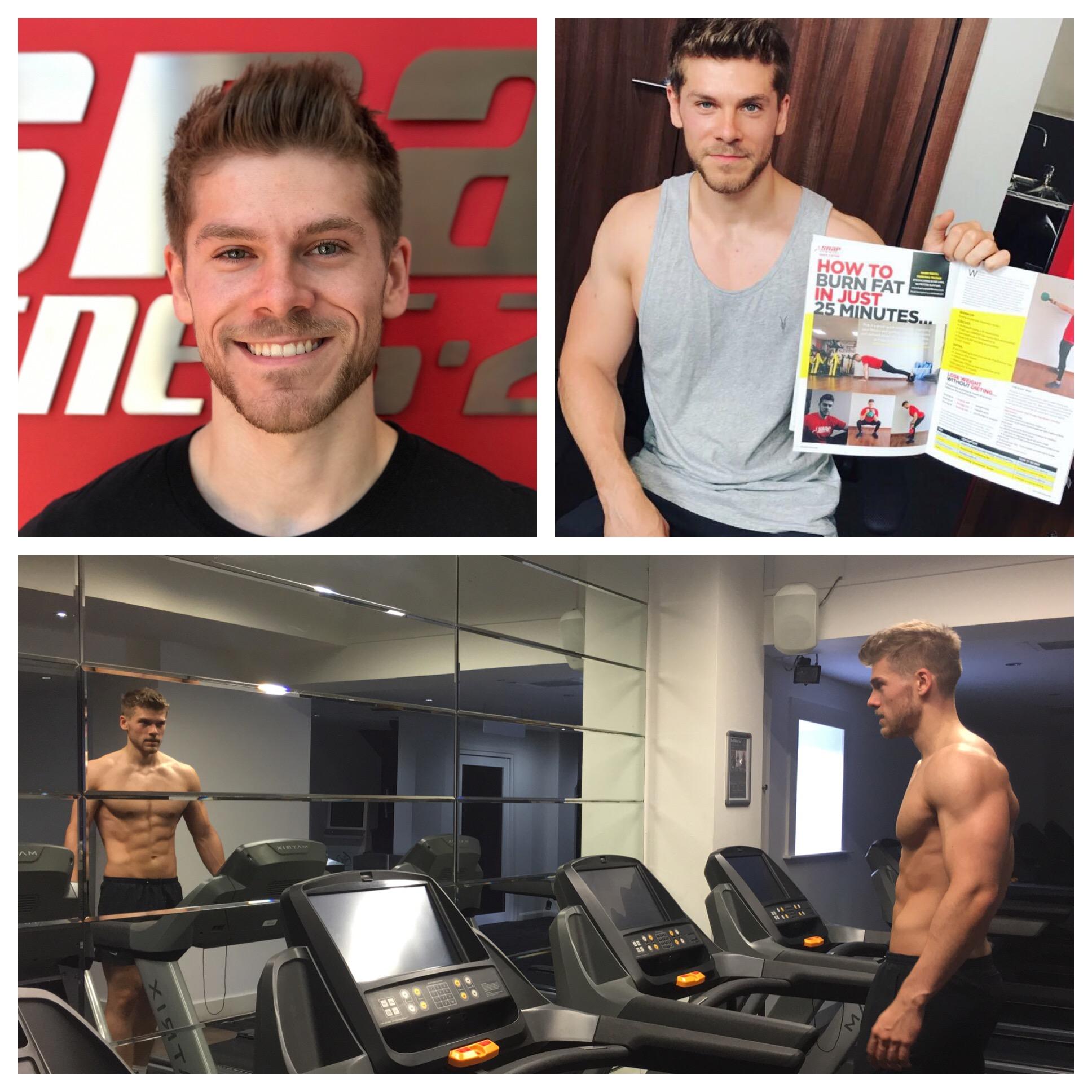
Harry Smith is a personal trainer who has trained actors including Danny Walters of Eastenders and Benidorm fame.
A typical day for me usually consists of two large meals, one smaller one and a couple of snacks. Here’s what it looks like:
5:30am - coffee. I start my day with a caffeine hit, always a black americano. I love the taste, it wakes me up and it’s only seven calories. Personally, I don’t like eating first thing in the morning because it would mean losing out on a little sleep. I don’t get hungry until around mid-morning anyway so it just doesn’t make sense for me.
Caffeine is an appetite suppressant too so this ticks me over until lunchtime. If my energy is feeling particularly low I’ll snack on some Fibre One brownies, low-cal popcorn, fruit or protein bars between clients.
6am-12pm - training clients
12:15pm - large breakfast. Lunchtime is when I have my breakfast and I look forward to it all morning. I try to eat around a third of my target calories for the day - this usually looks like four slices of toast, four eggs, two bacon medallions, about 100g smoked salmon, an apple and a tangerine.
It’s huge because it’s my breakfast and also my pre-workout meal. If I get hungry mid-workout I’ll be distracted and probably walk straight out of the gym in search for food. I make sure there’s a decent amount of carbs to fuel my workout, lots of fat to satiate me and top up the omegas, high protein to stimulate muscle repair and some fruit for the vitamins and micronutrients.
1:30pm-2:30pm - workout
3pm - small lunch. Late lunch is meal two, this is usually something quick because I’m on a tight schedule. Whey protein and 100g of porridge or any other breakfast cereal that is currently taking my fancy.
It’s a good idea to have a decent serving of protein post-workout (at least 25g) but it’s much less important than just eating enough protein over the course of the day in general so don’t get too hung up on it if you schedule doesn’t permit this.
4pm-8.30pm - training clients
9pm - large dinner. Dinner is where it gets really fun for me as I usually have around 1000 calories to clean up. My only rules are: it’s got to be quick, tasty and have a load of green veggies.
This can be anything from a couple of seasoned and grilled chicken breasts, lots of new potatoes and broccoli, or a spaghetti bolognese made with low fat mince and a ton of cheese. Whatever I choose I make sure I don’t exceed my current calorie target. Sometimes I’ll save some calories for a bedtime bowl of cereal or some frozen yoghurt.
Years of trial and error have taught me that I prefer to eat much larger infrequent meals and not to start eating until later on in the day. This isn’t because there are any significant inherent health benefits to fasting but entirely because it fits into my schedule, that it allows me to adhere to my calorie and macronutrient goals and that I eat fruits and vegetables letting me tick the all important boxes: practical, sustainable, healthy.
Eating fewer, larger meals means that those meals can contain lots of calories giving me the flexibility to enjoy foods typically not associated with dieting e.g. bread, cereal, frozen yoghurt/ice cream, pasta etc.
My supplement regime is very boring unfortunately! Just one vitamin D3 cap, about 5g creatine and a multivitamin if I remember to take it (there’s not a lot of things you remember to do at 5:30am!).
David Jones
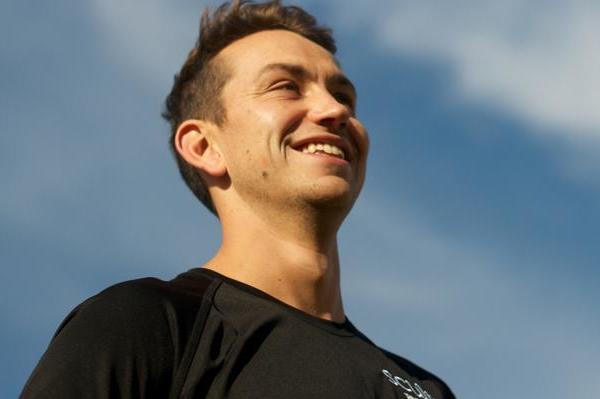
David Jones is a former international swimmer and the founder of Sculpt Health and Fitness, an exclusive health and fitness consultancy based in central London.
I love food and cooking but mainly I love eating. At Sculpt we encourage our clients to enjoy a varied, balanced and nutritious diet devoid of deprivation and guilt. If the thought of eating grilled chicken and broccoli from a tupperware three times a day makes me want to cry why would I recommend it to anyone else?
On any given day I’m up at 5.15am to coach clients for seven to eight hours and then I’ll swim or lift weights for an hour. As both my job and lifestyle are very physically active I eat quite a lot of carbs to fuel myself and protein for muscle growth and repair. I don’t really have a typical day as my diet is pretty varied but yesterday I ate:
Breakfast - scrambled eggs on toast with feta cheese and rocket.
Snack - a bag of mixed nuts and an apple.
Lunch - puy lentil, chorizo, tomato and spinach stew leftover from the previous night’s dinner.
Dinner - sea bass ceviche and tacos. Dark chocolate covered rice cakes for dessert.
To drink throughout the day I’ll have coffee, green tea and water. I supplement my diet with berocca, magnesium, zinc, vitamin D and omega 3s.
Oh, and a world without pizza, red wine, curry and posh salted dark chocolate is not one I’d be interested in living on.
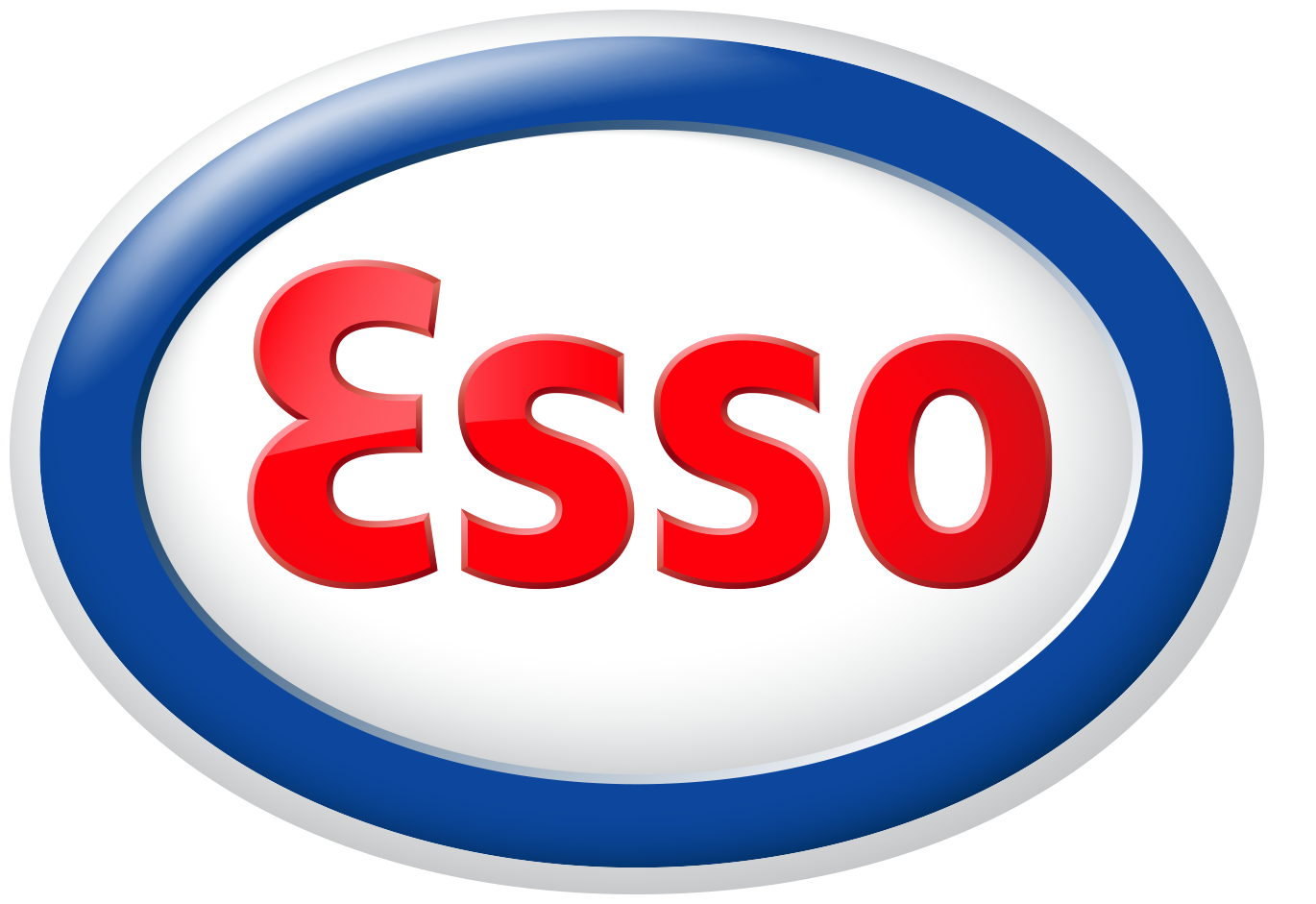
Join our commenting forum
Join thought-provoking conversations, follow other Independent readers and see their replies
Comments